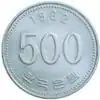| Value | 500 South Korean won |
|---|---|
| Mass | 7.70 g |
| Diameter | 26.5 mm |
| Thickness | 2.00 mm |
| Edge | 120 reeds |
| Composition | Cupronickel 75% Cu 25% Ni |
| Years of minting | 1982–present |
| Obverse | |
 | |
| Design | Red-crowned crane, value (hangul) |
| Designer | - |
| Design date | 1982 |
| Reverse | |
 | |
| Design | Value (digit), bank title, year of minting |
| Designer | - |
| Design date | 1982 |
The 500 won coin (Korean: 오백원 동전; Hanja: 五百圓 銅錢; RR: Obaegwon dongjeon; MR: Obaegwŏn tongjŏn) is one of the South Korean won coins issued by the Bank of Korea, the central bank of South Korea.
Design
On the obverse is a Red-crowned crane, one of the migratory birds that lives in South Korea, and the inscription "오백원" (Obaegwon), which means 500 won. On the reverse is the Arabic number "500", which means 500 won, the year of manufacture, and the "한국은행" (Hanguk Eunhaeng), which means the Bank of Korea. The Composition of the coin is Cupronickel (75% copper, 25% nickel), weighs 7.70g, has a diameter of 26.50mm and a thickness of 2.00mm, with 120 reeds carved on the edge. The red-crowned crane drawn on the coin looks like it is flying, which means "second economic leap" and "South Korea leap in the international community".[1][2][3]
History
On January 21, 1982, the Bank of Korea approved a plan to issue 500 won coins to replace the existing 500 won banknotes,[4] and on June 12, 1982, 500 won coins were first issued.[5] On January 15, 1983, the Bank of Korea issued a 1 won coin, 5 won coin, 10 won coin, 50 won coin and 100 won coin that modified the design form to match the 500 won coin.[6]
The Bank of Korea originally planned to issue about 56,000,000 500 won coins in 1998, but canceled them after a campaign to collect coins took place in various regions of South Korea due to the influence of South Korea's request for an IMF bailout on December 3, 1997. Instead, the Bank of Korea has collected large amounts of 500 won coins from various regions of South Korea, while producing only about 8,000 500 won coins for gift sets. For this reason, only about 1,000 of the 500 won coins issued in 1998 are estimated to be circulating on the market, and due to their high scarcity, they are traded at hundreds of thousands of won per coin.[7][8]
Counterfeiting issues

In Japan in the late 1990s, South Korean 500 won coins were similar to Japanese 500 yen coins, shape, size, material, and weight (composition of the Japanese 500 yen coin: Cupronickel (75% copper, 25% nickel), weight: 7.20g, diameter: 26.5mm) and were used for vending machines. The counterfeit South Korean 500 won coins were often weighed down mainly by shaving or drilling holes in the surface of the coins with electric drills, and the criminals used many of the methods of putting counterfeit South Korean 500 won coins into vending machines installed in various regions of Japan and then turning the return lever to change them into Japanese 500 yen coins.[9][10][11] Due to these incidents, various regions of Japan have banned the use of 500 yen coins in vending machines for sometime,[12][13] and in 1999, the Japanese government decided to stop issuing cupronickel 500 yen coins.[14] In 2000, nickel-brass 500 yen coins (composition: nickel-brass (72% copper, 20% zinc, 8% nickel), weight: 7.00g, diameter: 26.5mm) were issued in Japan.[15]
References
- ↑ "200萬(만)개 풀었어도 보기힘든 500원鑄貨(주화)" (in Korean). Kyunghyang Shinmun. June 24, 1982. Retrieved October 25, 2020.
- ↑ "돈…圖案(도안) 바꾼다" (in Korean). The Chosun Ilbo. January 16, 1983. Retrieved October 25, 2020.
- ↑ "[O2/커버스토리]1998년생 500원짜리 동전 실종사건" (in Korean). The Dong-a Ilbo. June 9, 2012. Retrieved October 25, 2020.
- ↑ "돈 내년에 모두 바뀐다" (in Korean). Maeil Business Newspaper. January 22, 1983. Retrieved 2020-11-03.
- ↑ "5백원짜리 鑄貨(주화) 6월12일에 발행" (in Korean). Maeil Business Newspaper. May 27, 1983. Retrieved 2020-11-03.
- ↑ "1百(백)원짜리등 5種鑄貨(종주화) 발행 文字(문자)배열통일 英文(영문)표기 없애" (in Korean). Kyunghyang Shinmun. January 14, 1983. Retrieved 2020-11-03.
- ↑ ""1998년도 500원 있으세요?" 팔면 100만원!" (in Korean). MoneyToday. June 15, 2012. Retrieved October 25, 2020.
- ↑ "1998년 만들어진 500원 동전 본 적 있나요?" (in Korean). Yonhap News Agency. March 23, 2018. Retrieved October 25, 2020.
- ↑ "일본, 변조된 500원 한국 동전의 유통 급증" (in Korean). MBC Newsdesk. August 25, 1997. Retrieved October 3, 2020.
- ↑ "500원짜리 동전을 일본 500엔짜리 변조해 일본으로 밀반출해온 일당, 경찰 검거" (in Korean). KBS News. October 27, 1999. Retrieved October 3, 2020.
- ↑ "500원짜리 동전을 일본 500엔짜리 동전 변조 유통시킨 일당 경찰 검거" (in Korean). KBS News. February 28, 2000. Retrieved October 3, 2020.
- ↑ "500원 동전, 일본에서 500엔으로 불법 유통돼" (in Korean). MBC Newsdesk. March 12, 1997. Retrieved October 3, 2020.
- ↑ "변조 500원 동전으로 일본 자판기서 15억 챙긴 일당 검거" (in Korean). MBC Newsdesk. February 28, 2000. Retrieved October 3, 2020.
- ↑ "日 변조막기위해 새 500엔 동전 검토" (in Korean). Yonhap News Agency. November 21, 1999. Retrieved October 3, 2020.
- ↑ "주화 이야기 - 500원, 우리나라가 먼저 만들었다" (in Korean). Bank of Korea. March 16, 2018. Retrieved October 3, 2020.